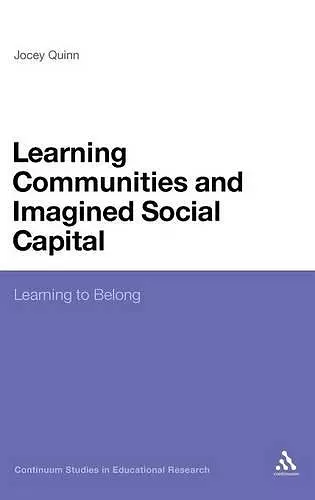Learning Communities and Imagined Social Capital
Learning to Belong
Professor Jocey Quinn author Anthony Haynes editor
Format:Hardback
Publisher:Bloomsbury Publishing PLC
Published:1st Apr '10
Currently unavailable, and unfortunately no date known when it will be back

Using theory drawn from education, feminist theory, cultural studies and human geography, this work explores the related issues of belonging, learning and community.
Using theory drawn from Education, Cultural Studies and Human Geography, this work explores the related issues of belonging, learning and community. It draws on a range of research studies conducted with adult learners both nationally and internationally in formal and informal contexts.Using theory drawn from Education, Cultural Studies and Human Geography, this work explores the related issues of belonging, learning and community. This book draws on a range of research studies conducted with adult learners both nationally and internationally in formal and informal contexts (including universities, voluntary sector and community based projects, work and leisure). It uses interdisciplinary theory drawn from Education, Cultural Studies and Human Geography to explore the related issues of belonging, learning and community. It critiques dominant ideas and practices of learning community in Higher Education and Lifelong Learning as simplistic and regulatory and argues that learners gain most benefit from creating their own symbolic communities and networks, which help to produce 'imagined' social capital. It demonstrates how such imagined social capital works, using a rich variety of empirical data. It then considers how these new critical perspectives can help us to rethink education as a cultural practice. "Continuum Studies in Educational Research (CSER)" is a major new series in the field of educational research. Written by experts and scholars for experts and scholars, this ground-breaking series focuses on research in the areas of comparative education, history, lifelong learning, philosophy, policy, post-compulsory education, psychology and sociology. Based on cutting edge research and written with lucidity and passion, the "CSER" series showcases only those books that really matter in education - studies that are major, that will be remembered for having made a difference.
'Professor Quinn brings the spirit of pleasure to an intellectually expansive analysis of belonging and the material needs of the learner. In so doing, this study takes us well beyond the common place in considering the impact of lifelong learning.' Christina Hughes, Professor of Women and Gender and Chairperson in the Department of Sociology, University of Warwick, UK
'In this important new book Jocey Quinn sets out her innovative work on imagined social capital in ways which bring alive the some 200 diverse learners who formed part of her data rich research. Through her powerful and stimulating analysis of (imagined) social capital she invites us to re-imagine educational spaces, terrains and communities, to discover the fluidity of ‘belonging'. This book is a timely intervention in debates about social capital and learning communities, arguing for new ways of belonging through resistance.' Sue Jackson, Professor of Lifelong Learning and Gender, Pro-Vice-Master for Learning and Teaching and Director of the Birkbeck Institute for Lifelong Learning, Birkbeck, University of London, UK
‘The author has crafted a piece that combines theory development with the voices of research informants, educationalists, sociologists, philosophers, poets and authors of modern literature. This is a readable book.' -- Widening Participation and Lifelong Learning
'Within her introduction, Quinn suggests that her aims for this book are twofold: "one is to develop generative and innovative thinking about learning, in a spirit of pleasure, the other is to pay critical attention to the needs of learners and to make a material difference in this world" (p. 2). This is an ambitious agenda, which has resulted in a challenging text: the reader's journey is not always easy, but it is always enjoyable and the rewards are worthwhile...Quinn has furnished this "shared space" in an eclectic style: the book is crammed with concepts drawn from across a range of academic disciplines, insights from poetry and fiction and a vast array of research data. Throughout, Quinn is attentive to the aesthetic qualities of the text: this is a book which Quinn has taken evident joy in the writing and which is a pleasure to read.' -- British Educational Research Journal * British Educational Research Journal *
'For me a particular strength of the book is the iconoclastic approach taken to some of the concepts that now seem ubiquitous in educational literature - particularly notions of identity, community and social capital... It is refreshing to read any academic work that does not simply tread the same old path, but which seeks to find new forms of expression - motivated not by idle preferences but by trying to find the best way of sharing particular ideas. I do not agree with all of the author's arguments and conclusions, but I do not think she expects any reader to. This is a book as dialogue.' -- Studies in Higher Education * Studies in Higher Education *
ISBN: 9781847061928
Dimensions: unknown
Weight: unknown
176 pages